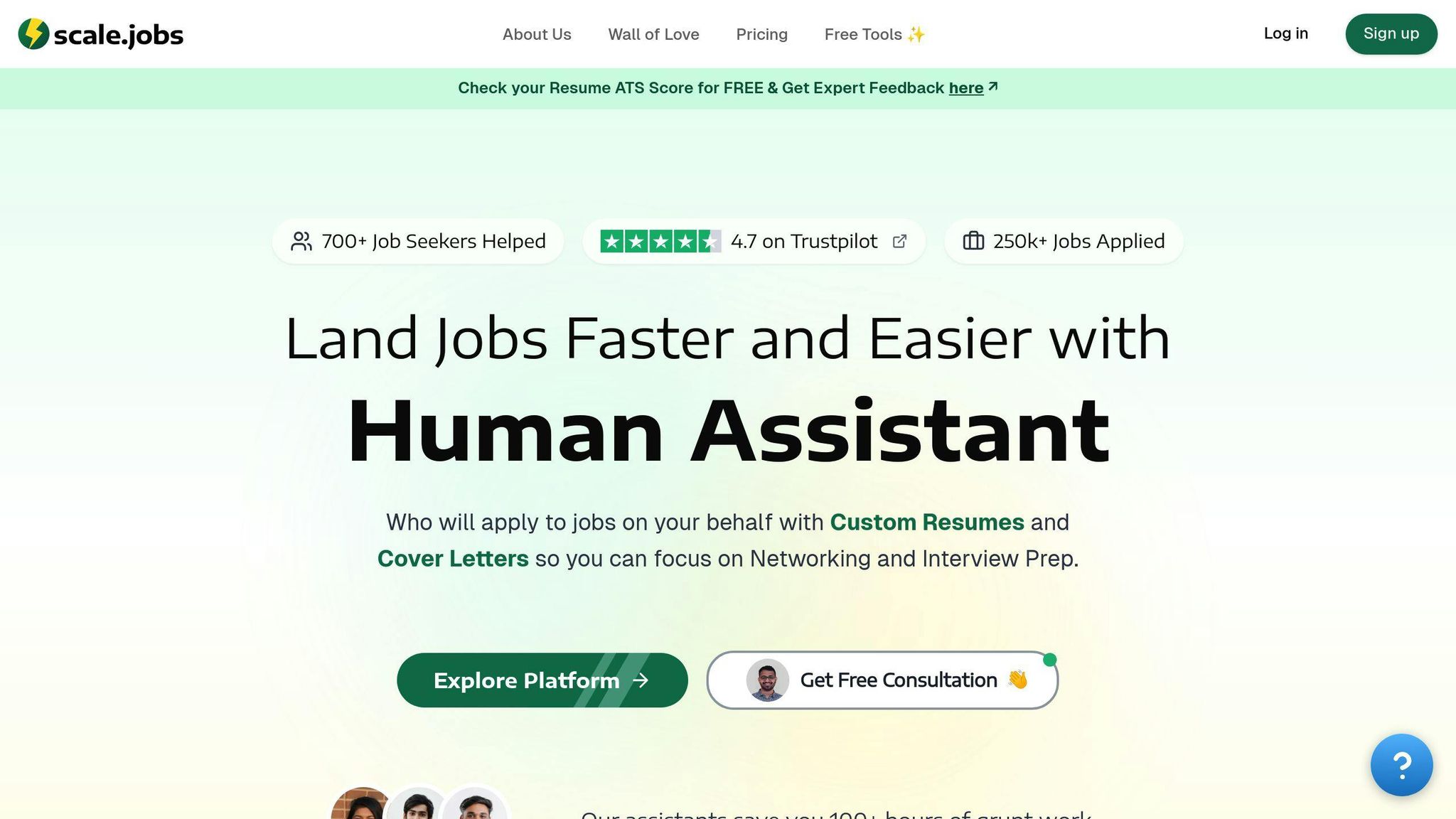How to Balance Job Search with Full-Time Work
Learn effective strategies to balance a job search with full-time work without sacrificing performance or well-being.

Balancing a full-time job and a job search can be tricky, but it’s doable with the right approach. Here’s how you can manage both without burning out:
- Set Clear Goals: Define what you want in your next role (skills, industry, work environment).
- Prioritize Tasks: Focus on tailored applications, networking, and interview prep instead of mass-applying.
- Use Time Wisely: Block specific times for job search tasks (e.g., mornings, lunch breaks, evenings).
- Leverage Tools: Use platforms like LinkedIn for job alerts and services like Scale.jobs to save time.
- Stay Professional: Keep job search activities private and maintain strong performance at your current job.
- Manage Stress: Pace yourself and set achievable goals to avoid burnout.
Easy Job Hunting Strategies - How to Look for a Job While Still Employed
Developing a Job Search Plan
Balancing a job search with full-time work can feel overwhelming. A clear, organized plan helps you make the most of your time and energy without burning out.
Setting Career Goals
Start by defining what you want in your next role. This clarity will guide your search and keep you focused. Think about:
| Career Goal Component | Questions to Consider |
|---|---|
| Role Requirements | What skills and experience are essential? |
| Industry Focus | Which industries match your interests and expertise? |
| Work Environment | What kind of culture and values are important to you? |
Take a hard look at your current job. What’s missing? What do you need to feel more fulfilled? Use these insights to set clear, actionable goals.
Prioritizing Job Search Tasks
When time is tight, focus on what works. Sending out hundreds of generic applications isn’t the answer. Instead, prioritize these steps:
- Tailored Applications and Networking: Customize your resume and cover letter for each role. Use your lunch break or evenings to connect with professionals in your field.
- Interview Prep: Dedicate time to researching companies and practicing answers to common questions.
If balancing these tasks feels impossible, consider outsourcing parts of the process. Services like Scale.jobs offer virtual assistants who can handle applications, giving you more time to focus on networking and preparing for interviews.
"You shouldn't be mass-applying to hundreds of postings and interviewing with 30 companies a week. You can't reasonably balance a job search that intense, and a full-time job, without something suffering."
Managing Time and Scheduling
Balancing a job search with full-time work can feel overwhelming, but managing your time well can keep you productive at work while making steady progress in your search.
Using Time Blocking
Time blocking is a great way to stay focused and consistent. It involves setting aside specific times for job search tasks. Pair this with the Pomodoro Technique - working in 25-minute bursts with 5-minute breaks - to keep your energy levels up.
| Time Block | Suggested Activities | Duration |
|---|---|---|
| Early Morning | Update your resume, research jobs | 45-60 mins |
| Lunch Break | Follow up on applications, network | 30 mins |
| Evening | Submit applications, prep for interviews | 60-90 mins |
While time blocking provides structure, it’s important to remain flexible to handle unexpected changes at work or in your job search.
Creating a Flexible Schedule
A flexible schedule helps you juggle work and job search tasks more easily. Use downtime wisely - listen to career podcasts or research companies during your commute. Save high-energy tasks like interview prep for when you’re most alert, and handle simpler tasks like updating your application tracker during low-energy moments.
For repetitive tasks like submitting applications, consider using services like scale.jobs. This frees up time for more impactful activities such as networking or preparing for interviews. Adjust your schedule regularly to account for:
- Work deadlines
- Upcoming interviews
- Networking events
Using tools and services can simplify your job search and help you stay organized.
Using Tools and Services
Creating a schedule is just the start. The right tools and services can help you manage your job search more efficiently while keeping up with your current workload.
Using Job Search Platforms
Platforms like LinkedIn and Indeed make job hunting easier by automating repetitive tasks. Features like job alerts, saved searches, and quick applications let you stay updated on opportunities without constantly checking job boards.
| Feature | How It Saves Time |
|---|---|
| Job Alerts | Get notified automatically about matching roles |
| Quick Apply | Apply instantly using pre-saved profiles |
| Saved Searches | Revisit customized filters with one click |
| Mobile Apps | Apply on the go - during a commute or on a break |
scale.jobs: A Time-Saving Solution

If you’re juggling a busy schedule, scale.jobs might be worth exploring. They offer human virtual assistants who handle tasks like creating tailored resumes and cover letters for $4/hour. This lets you focus on networking or preparing for interviews while ensuring your applications are professional and polished.
Free Job Search Tools
You don’t need to spend a fortune to make your job search more efficient. Several free tools can help:
- Resume Optimization: Use ATS checkers and feedback tools to make sure your resume gets through automated screenings.
- Application Management: Keep track of your applications, estimate salaries, and prep for interviews with all-in-one tools.
Integrating these tools into your routine can help you stay organized and save time, making it easier to balance your job search with your current responsibilities.
Maintaining Professionalism During Job Search
Keeping Job Search Private
It's important to keep your job search under wraps to safeguard your current position and maintain good relationships with colleagues. Use personal devices and private email accounts to ensure privacy while focusing on your search during appropriate times.
| Activity | Do's | Don'ts |
|---|---|---|
| Device Usage | Use personal devices | Avoid job sites on work devices |
| Communication | Schedule calls during breaks | Take recruiter calls at work |
| Online Presence | Adjust LinkedIn privacy settings | Share job search updates publicly |
Focusing on Current Job Duties
When exploring new opportunities, it's crucial to maintain strong performance in your current role. This not only secures positive references but also reflects well on your professionalism to both current and potential employers.
Tips for Balancing Work and Job Search:
- Adjust your schedule to handle work and interviews with minimal disruption.
- Stay focused on your main responsibilities to maintain strong performance.
- Keep open communication with your supervisor about your work (not your job search!).
- Track your accomplishments to showcase your contributions.
If your employer becomes aware of your job search, handle the situation calmly. Reassure them of your dedication to your current role while explaining your desire for career growth. Remember, how you perform now can shape your future opportunities.
Conclusion: Key Points for Balancing Job Search and Full-Time Work
Balancing a job search while working full-time can feel overwhelming, but a few strategies can make it manageable.
Start with smart time management. Use tools like time blocking to organize your day and focus on submitting well-thought-out applications instead of sending out dozens of generic ones. This approach saves time and increases your chances of landing interviews.
Leverage helpful tools and services to simplify your search. Platforms like scale.jobs can handle repetitive tasks, freeing you up to focus on networking and preparing for interviews. Free resources for resume optimization and tracking applications can also keep things organized and efficient.
Don’t let your current job take a backseat. Keep delivering strong results at work while setting clear boundaries for job search activities. Think of your search as a steady, long-term effort rather than a frantic rush. Combine this with regular self-care to avoid burnout and stay energized.
FAQs
How to look for a new job discreetly?
Searching for a new job while you're still employed takes careful planning to avoid raising any red flags. Here are some tips to keep your search private:
Adjust Your Online Presence
Switch your LinkedIn profile to private mode, turn off notifications for updates, and make sure your job preferences are only visible to recruiters. This way, your current network won't see your activity.
Plan Interviews Wisely
- Arrange phone interviews during early mornings or lunch breaks.
- Use paid time off (PTO) strategically for in-person interviews, like scheduling them on Fridays to minimize disruptions.
- Try to group multiple interviews on the same day to reduce the number of days you need off.
Keep Communication Private
Stick to personal devices and email accounts for all job-related activities. Avoid discussing your job search with colleagues, and never use company resources or time for applications.
Streamline Your Search
Tools like Scale.jobs can help you manage applications efficiently, so you can focus on networking and interviews without compromising your current role.
Lastly, stay committed to your current job. Keep up your performance and handle job search activities during your personal time. Be strategic with your PTO to ensure your search stays under the radar.




